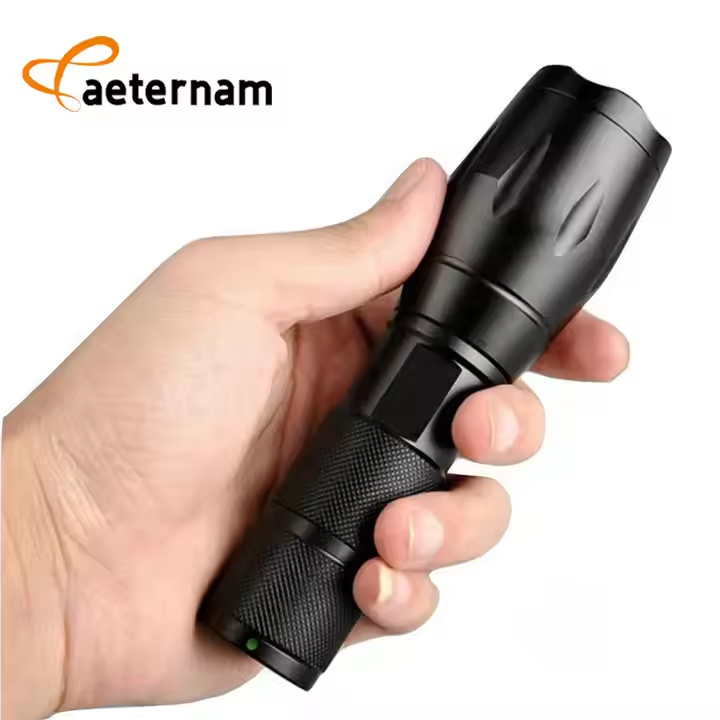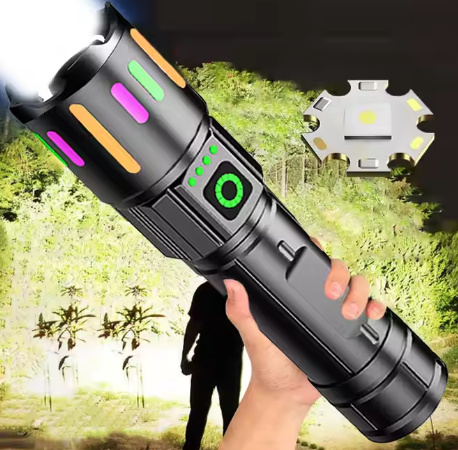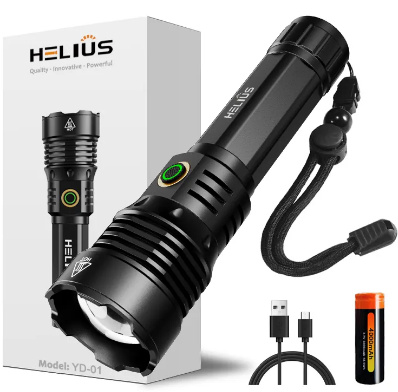Top Flashlights for Construction and Industrial Workforces

Reliable lighting equipment is essential for construction and industrial workforces, especially when considering the Top Flashlights for Construction and Industrial Workforces. Without proper light, you face risks like accidents, reduced productivity, and slower progress. Common challenges include insufficient light, glare, and poorly distributed illumination. Dust, debris, and vibrations from machinery can also damage lighting tools. A dependable flashlight ensures safety and efficiency in these demanding environments. The best flashlights are durable, portable lighting solutions that withstand harsh conditions. Whether you’re working in emergency situations or routine tasks, choosing the right flashlight from trusted flashlight manufacturers can make all the difference in your work performance.
Key Takeaways
Pick flashlights that are strong and long-lasting. Choose ones made of aluminum or tough plastic to handle hard use.
Get flashlights with 500 lumens or more for most jobs. More lumens help you see better in dark or big spaces.
Use rechargeable batteries to save money over time. They create less trash and cost less than throwaway batteries.
Check if the flashlight is waterproof. Look for IPX7 or IPX8 ratings if it might go underwater.
Find flashlights with hands-free options like magnets or clips. These help you work safely without holding the flashlight.
Key Features to Look for in Industrial Flashlights

Durability and Build Quality
Impact resistance for tough environments
When working in construction or industrial settings, you need a flashlight that can handle rough conditions. Flashlights designed for these environments often feature drop resistance, ensuring they survive accidental falls. Many models include potted electronics, which enhance their ability to withstand impacts. This durability ensures your flashlight remains functional even after repeated use in demanding situations.
Materials like aluminum or reinforced plastic
The materials used in industrial flashlights play a significant role in their durability. Common options include:
Aluminum: This material is excellent for high-performance illumination due to its heat dissipation properties. However, it can become dangerously hot in high-temperature environments.
Polymer plastic: This material is safer for hazardous conditions as it does not conduct heat. It also offers lightweight yet durable construction, making it ideal for extended use.
Hybrid designs: Some flashlights combine a plastic body with a metal tube liner for added strength and versatility.
Brightness and Beam Distance
Lumens and their importance
The brightness of a flashlight, measured in lumens, determines how well it illuminates your workspace. For industrial flashlights, higher lumens provide better visibility in dark or expansive areas. A flashlight with at least 500 lumens is ideal for most tasks, while more powerful models can exceed 1,000 lumens for specialized applications.
Adjustable beam settings for versatility
Adjustable beam settings allow you to customize the light output based on your needs. A wide beam is perfect for illuminating large areas, while a focused beam is better for detailed tasks. Many LED flashlights offer multiple modes, such as high, medium, and low, giving you flexibility in various work environments.
Battery Life and Power Options
Rechargeable vs. disposable batteries
Choosing between rechargeable and disposable batteries depends on your priorities. Rechargeable batteries offer significant cost savings over time. For example, a heavy equipment manufacturer saved over $200 per flashlight in the first year by switching to rechargeable models. They also reduce waste, making them an eco-friendly option.
"When you use rechargeable batteries in your flashlights instead of buying disposable batteries, you see a tremendous amount of hard cost savings," says Freund.
Runtime for extended work shifts
Long battery life is essential for uninterrupted work. Industrial flashlights often feature runtimes that last through extended shifts. Models with lithium-ion batteries provide consistent performance and are ideal for high-demand tasks. Always check the runtime specifications to ensure the flashlight meets your work requirements.
Waterproofing and Weather Resistance
IP ratings and what they mean
Waterproofing is critical for industrial flashlights, especially when you work in wet or unpredictable environments. The Ingress Protection (IP) rating system helps you understand how well a flashlight resists water. Here’s a quick guide to common IP ratings:
IP Rating | Description |
|---|---|
IPX4 | Protection against splashing water from any direction. |
IPX5 | Protection against low-pressure water jets from any direction. |
IPX6 | Protection against strong water jets and waves. |
IPX7 | Can be submerged in water up to 1 meter for up to 30 minutes. |
IPX8 | Can be submerged deeper than 1 meter for extended periods (manufacturer-specified). |
When choosing a flashlight, consider the IP rating based on your work environment. For instance, IPX4 or IPX5 is sufficient for light rain, while IPX7 or IPX8 is better for tasks involving water submersion.
Performance in extreme temperatures
Flashlights often face extreme temperatures in industrial settings. High ambient temperatures can reduce the performance of LED fixtures. The heat increases junction temperatures in LEDs, leading to lower light output and faster lumen depreciation. Prolonged exposure to heat also damages electronic components, shortening the flashlight's lifespan. If you work in hot environments, look for models designed to handle high temperatures without compromising performance.
Additional Features
Hands-free options like magnetic bases or clips
Hands-free operation can make your job easier and safer. Many industrial flashlights include magnetic bases, allowing you to attach them to metal surfaces. This feature is perfect for tasks requiring both hands. Some models also come with clips or head straps, giving you flexibility to position the light exactly where you need it.
Anti-slip grip and ergonomic design
A secure grip is essential when you work in challenging conditions. Flashlights with anti-slip coatings or textured handles prevent accidental drops. Ergonomic designs reduce hand fatigue during extended use. These features ensure comfort and reliability, even in demanding environments.
Top Flashlights for Construction and Industrial Use

Fenix PD36R
Key features and specifications
The Fenix PD36R stands out as one of the best flashlights for construction and industrial workforces. Its robust design and impressive performance make it a reliable choice for demanding environments.
Feature | Description |
|---|---|
Lumen Output | 1600 lumens max output |
Beam Distance | 928 feet |
Durability | Made from durable aluminum, IP68 waterproof (submersible up to 6.5 ft) |
Battery | ARB-L21-5000 mAh rechargeable battery |
Charging | USB Type-C charging cable included |
Runtime | 115 hours on ECO mode (30 lumens), 2.9 hours on turbo (1600 lumens) |
Portability | Two-way body clip for easy carrying |
This high-quality flashlight offers exceptional brightness with its 1600-lumen output, ensuring excellent visibility in low-light conditions. Its extended runtime of up to 115 hours on ECO mode makes it ideal for long work shifts. The durable aluminum construction and IP68 waterproof rating allow it to withstand tough environments.
Pros and cons
Pros:
High brightness and long beam distance.
Durable and waterproof design.
Rechargeable battery with USB Type-C charging.
Compact and portable with a two-way clip.
Cons:
Higher price compared to other models.
Turbo mode drains the battery quickly.
Milwaukee 2162
Key features and specifications
The Milwaukee 2162 is another excellent option among the best flashlights for industrial use. It combines durability with advanced features to meet the needs of construction workers. This LED flashlight delivers consistent performance, even in challenging conditions.
Lumen Output: 1100 lumens for powerful illumination.
Beam Distance: Covers up to 700 feet.
Durability: Impact-resistant and rated IP67 for water and dust resistance.
Battery: Powered by a rechargeable REDLITHIUM™ USB battery.
Runtime: Up to 14 hours on low mode.
Additional Features: Includes a magnetic base for hands-free use and a pivoting head for adjustable light angles.
Pros and cons
Pros:
Durable and weather-resistant design.
Long runtime and rechargeable battery.
Hands-free operation with a magnetic base.
Adjustable beam angles for versatility.
Cons:
Slightly heavier than other models.
Limited brightness compared to the Fenix PD36R.
ThruNite Archer 2A C
Key features and specifications
The ThruNite Archer 2A C is a versatile and lightweight option among the top flashlights for construction and industrial workforces. Its compact design and user-friendly features make it a practical choice for various tasks.
Feature | Description |
|---|---|
Build Quality | Lightweight yet sturdy with premium type III hard-anodized aluminum finish. |
Battery Compatibility | Compatible with both a lithium-ion battery (141000) and 2 AA batteries, enhancing versatility. |
User Interface | Features an e-switch for mode selection and a stable tail switch for easy activation. |
Pocket Clip | Reversible pocket clip allows for different carrying orientations, though it may stick out. |
Warranty | 2 years free replacement for normal use issues, plus lifetime limited maintenance. |
This LED flashlight offers flexibility with its dual battery compatibility and multiple carrying options. Its lightweight design ensures comfort during extended use.
Pros and cons
Pros:
Lightweight and durable construction.
Dual battery compatibility for convenience.
Easy-to-use interface with multiple modes.
Excellent warranty and maintenance support.
Cons:
Pocket clip design may feel awkward.
Limited color temperature options.
Luxtreme MZ60 Blueline
Key features and specifications
The Luxtreme MZ60 Blueline stands out as one of the best flashlights for construction and industrial workforces. Its dual functionality allows it to serve as both a flashlight and a spotlight, making it versatile for various tasks. With a maximum output of 1000 lumens, it provides excellent close-range illumination. For long-range needs, its beam distance exceeds half a mile, ensuring visibility in expansive areas.
This LED flashlight offers five adaptable light modes, allowing you to adjust the brightness based on your requirements. Its robust construction, made from aircraft-grade aluminum, ensures durability in harsh conditions. The IP67 waterproof rating protects it from water and dust, making it reliable in challenging environments.
Additional features include USB-C rechargeability and a 4000mAh Li-ion battery, which charges fully in about three hours. The flashlight also functions as a power bank, enabling you to charge other devices during emergencies. Smart Power Control (SPC) technology ensures efficient energy use, extending its runtime.
Feature | Description |
|---|---|
Dual Functionality | Functions as both a flashlight and spotlight. |
Lumen Output | 1000 lumens for close-range illumination. |
Beam Distance | Impressive half-mile+ beam distance for long-range performance. |
Light Modes | 5 adaptable light modes for various situations. |
Construction | Robust design with IP67 waterproof rating, suitable for harsh conditions. |
Pros and cons
Pros:
Exceptional beam distance for long-range tasks.
Durable and waterproof design.
USB-C rechargeable with power bank capability.
Multiple light modes for flexibility.
Cons:
Slightly heavier than other models.
Higher price point compared to basic flashlights.
BIG Larry 600 Rechargeable Work Light
Key features and specifications
The BIG Larry 600 Rechargeable Work Light is another excellent choice among the top flashlights for construction and industrial workforces. It delivers 600 lumens from the work light and 200 lumens from the top flashlight, ensuring powerful illumination for various tasks. Its dimmable functionality allows you to customize the brightness, making it suitable for both detailed work and general lighting.
This flashlight is emergency-ready, featuring a red light with steady and flashing modes. Its versatile design enables it to function as a flashlight, work light, and task light. The durable construction, made from aircraft-grade aluminum, ensures impact resistance and IPX7 waterproofing.
The magnetic base allows hands-free operation by attaching to metal surfaces. It includes a rechargeable battery and a USB-C charging cable, ensuring convenience and portability. With seven light modes, including variable dimming and Direct-to-Red, this LED flashlight adapts to your specific needs.
Pros and cons
Pros:
Versatile design for multiple applications.
Emergency-ready with red light modes.
Durable and waterproof construction.
Hands-free operation with a magnetic base.
Cons:
Limited beam distance compared to other models.
Bulkier design may reduce portability.
How to Choose the Right Flashlight for Your Needs
Assessing Your Work Environment
Indoor vs. outdoor use
Your work environment plays a critical role in determining the right flashlight. For indoor tasks, you may need a compact flashlight with a wide beam to illuminate confined spaces. Outdoor environments, on the other hand, often require a flashlight with a long beam distance to cover expansive areas. If you frequently work outdoors, consider models with weather-resistant features to handle rain, dust, or extreme temperatures.
Specific hazards or challenges
Every job site presents unique challenges. Construction sites, for example, often involve dust, debris, and vibrations. In such cases, a durable LED flashlight with impact resistance and waterproofing is essential. If your work involves hazardous materials, choose a flashlight with non-conductive materials to ensure safety. Always evaluate the specific risks in your environment before making a decision.
Matching Features to Job Requirements
Importance of brightness for detailed tasks
Brightness is crucial for tasks requiring precision. A flashlight with adjustable brightness settings allows you to switch between high-intensity light for detailed work and lower settings for general illumination. For most industrial tasks, a flashlight offering at least 500 lumens ensures adequate visibility.
Durability for heavy-duty applications
Durability is non-negotiable in demanding jobs. Flashlights made from aircraft-grade aluminum or reinforced plastic can withstand rough handling. Look for models with high IP ratings to ensure resistance to water and dust. A durable flashlight not only lasts longer but also reduces the risk of failure during critical tasks.
Budget Considerations
Balancing cost with quality
While it’s tempting to choose the cheapest option, investing in a high-quality flashlight often pays off in the long run. Cheaper models may lack essential features like durability or long battery life, leading to frequent replacements. Prioritize quality to avoid disruptions in your work.
Long-term savings with rechargeable options
Rechargeable flashlights offer significant financial and environmental benefits. A heavy equipment manufacturer once used 16,000 disposable batteries annually. By switching to rechargeable models, they saved over $200 per flashlight in the first year. Rechargeable batteries also reduce waste and recycling costs, making them a sustainable choice for industrial workers. Although the initial cost may be higher, the long-term savings and convenience make rechargeable flashlights a smart investment.
Maintenance Tips for Longevity
Cleaning and Storage
Removing dirt and debris
Keeping your flashlight clean ensures optimal performance. Dirt and debris can accumulate on the lens and body, reducing brightness and functionality. Use a soft, damp cloth to wipe the exterior. For stubborn grime, apply mild soap and water, but avoid submerging the flashlight unless it has a high waterproof rating. Clean the lens gently with a microfiber cloth to prevent scratches. Regular cleaning keeps your flashlight ready for use in any situation.
Proper storage to prevent damage
Proper storage protects your flashlight from unnecessary wear. Store it in a cool, dry place to avoid damage from moisture or extreme temperatures. Direct sunlight can degrade the materials and shorten battery life, so keep it in a shaded area. If you don’t plan to use the flashlight for an extended period, remove the batteries to prevent leakage or corrosion. Always use the manufacturer’s charger to avoid overcharging or overheating. These steps ensure your flashlight stays in excellent condition.
Battery Care
Avoiding overcharging or deep discharge
Battery care plays a vital role in maintaining your flashlight’s longevity. Overcharging can reduce battery lifespan, while deep discharge may cause permanent damage. Charge your flashlight in a safe location, away from flammable materials. Follow the manufacturer’s guidelines for charging times and avoid leaving it plugged in overnight. Proper charging habits keep your flashlight reliable for extended use.
Replacing batteries promptly
Replace batteries as soon as you notice reduced performance. Weak batteries can cause inconsistent light output or sudden shutdowns. Always keep spare batteries on hand, especially for critical tasks. Using high-quality batteries recommended by the manufacturer ensures optimal performance and prevents damage to the flashlight’s internal components.
Regular Inspections
Checking for wear and tear
Inspect your flashlight regularly for signs of wear. Look for cracks, dents, or loose parts that could affect its functionality. Check the lens for scratches or cloudiness, as these can reduce light output. Identifying issues early allows you to address them before they become major problems.
Replacing damaged parts
Replace damaged parts immediately to maintain your flashlight’s performance. Many models offer replaceable lenses, switches, or battery compartments. Using original parts from the manufacturer ensures compatibility and reliability. Regular maintenance extends the lifespan of your flashlight and keeps it functioning at its best.
Choosing the right flashlight for your construction tasks ensures safety and efficiency. Look for key features like durability, brightness, and long battery life. Waterproofing and hands-free options also enhance usability in tough environments. Among the top options, the Fenix PD36R stands out with its powerful light output, rugged design, and extended runtime. Investing in a reliable flashlight improves your work performance and reduces risks in challenging conditions. Equip yourself with the best tools to stay productive and safe on the job.
FAQ
What is the ideal brightness level for industrial flashlights?
The ideal brightness depends on your tasks. For general use, 500 lumens work well. For detailed or outdoor tasks, choose flashlights with 1,000 lumens or more. Adjustable brightness settings offer flexibility for different environments.
How do I know if a flashlight is waterproof?
Check the IP rating. For light rain, IPX4 or IPX5 works. For submersion, look for IPX7 or IPX8. Always match the rating to your work environment for reliable performance.
Are rechargeable flashlights better than disposable ones?
Rechargeable flashlights save money over time and reduce waste. They are eco-friendly and convenient for long-term use. Disposable batteries may suit occasional use but cost more in the long run.
How can I extend the life of my flashlight?
Clean it regularly to remove dirt. Store it in a cool, dry place. Avoid overcharging or deep-discharging the battery. Inspect for wear and replace damaged parts promptly to maintain performance.
What features make a flashlight suitable for hands-free use?
Look for magnetic bases, clips, or head straps. These features let you position the flashlight securely, freeing your hands for tasks. Hands-free options improve safety and efficiency in demanding environments.
See Also
Selecting Ideal Flashlights for Bulk Buying Opportunities
Benefits of High-Power XHP360 LED Flashlights for Bulk Buyers
Enhancing Business Reach with Personalized Flashlights for Promotions
Complete Overview of EDC Flashlights for Wholesale Buyers
Finding the Right Flashlight Supplier for Your Business Needs
